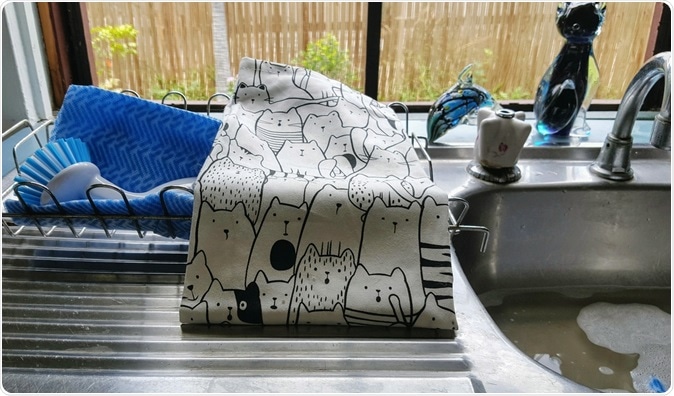Repeated use of the tea towels in the kitchen may be putting the families at risk of food poisonings finds study.

Tea towels in the kitchen could be responsible for food poisonings finds study. Image Credit: Mari Nelson / Shutterstock
University of Mauritius have found that E. coli, a common stomach upset bug, is found abundantly in tea towels that are used for multiple purposes in the kitchens. They examined 100 tea towels that had been used for a month. These towels are used for wiping surfaces, utensils and hands. These warm and damp cloths are actually havens for bacterial growth say scientist and they are most commonly used in households where meat is eaten. Because they are used for various purposes, they tend to help spread the bacteria to different surfaces and areas in the house leading to food poisoning, the researchers explain.
According to government recommendations, these cloths, oven gloves and sponges should be washed or changed and allowed to dry completely before being reused.
The team is presenting the results of their work at the annual meeting of the American Society for Microbiology in Atlanta, Georgia. They gathered 100 samples of used tea towels and swabbed them for bacteria present on their surfaces. These were then cultured and identified to determine their bacterial load. They noted that 49 percent of the towels had growth of bacteria in them. The number of bacterial colonies growing in the towels rose with the family size and with presence of more number of children.
In the 49 towels that showed bacterial load, 36.7 percent showed coliform bacteria or a group that includes the deadly E. coli. Enterococcus was found in 36.7 percent samples and Staphylococcus was found in 14.3 percent samples, the researchers noted. Both coliforms and staphylococcus species of bacteria were higher in families that ate meat. Some strains of the coliforms are known to cause severe food poisonings that could necessitate hospitalization and may even become life threatening. The study noted presence of staphylococcus in towels that come from families that belong to lower socio-economic conditions and those with large number of kids. Staphylococcus can produce a dangerous toxin that can cause severe illness, say researchers. It can be killed by using high heat.
The experts have recommended that these towels and other regular use cloths in the kitchen should be replaced daily on days of cooking. Washing tea towels should be in at least 60C (140F) with proper use of disinfectants. Using disposable or paper towels can prevent the risk of spreading of bacteria. Washing up brushes, dishwashers should be washed with detergents and warm water after every use to prevent them from harbouring bacteria. Food preparation surfaces are important and should be cleaned before use and after use. Chopping boards are best for uncooked food including raw meats as well as salads. All surfaces should be cleaned after use and most importantly hands should be washed before preparation of food and after handling raw meat, fish, eggs or poultry.
According to lead author of the study, Dr Susheela Biranjia-Hurdoyal, the presence of coliforms indicate that there is a possibility of bad hygiene and fecal contamination. She said that these results show bad handling of non-vegetarian foods in the kitchen. She said humid and damp towels that used for multiple purposes should be discouraged. Hygiene maintenance is vital for families that have more members or have children and elderly she said.